考研阅读精选:维基百科渐渐进入大学课堂
来源:新东方在线
发布时间:2016-12-15
『教授们不想让学生依赖网络,但又不得不承认,网络确实是从事研究时一个有用的入门工具。』
Wikipedia Gradually Accepted in College Classrooms
维基百科渐渐进入大学课堂
June 20, 2011 | From US News & World Report


In 1775, Paul Revere boisterously rung bells to warn colonists of an impending influx of British soldiers.
Actually, he didn"t. But anyone who visited the Wikipedia page dedicated to Revere earlier this month may have thought that to be the case. The erroneous addition was made in the wake of former Alaska Gov. Sarah Palin's flummoxed ramblings regarding the famed colonist that were caught on camera and soon went viral. Though the additions to the Wikipedia entry—likely added by a supporter to give credence to Palin's claims—were soon removed by Wikipedia's editors, the instance highlighted the problem inherent in Wikipedia's crowd sourcing nature: Errors, though they may be caught, can still be posted, viewed, and absorbed by impressionable minds.
This is precisely why college professors almost universally bar students from citing any information they glean from the site, despite the fact that it was the fourth most visited destination on the Internet in 2010, according to Google. That's not to say the site is blackballed among the academic community; some professors at schools such as Georgetown University and Virginia Tech have asked students to write their own wikis in lieu of traditional research papers. However, despite its size and omnipresence in modern culture, Wikipedia hasn't attained status as a trusted source of information in academia—and it likely won't soon.
"As an open source that is not subjected to traditional forms of peer review, Wikipedia must be considered only as reliable as the credibility of the footnotes it uses," says Maurice Hall, associate professor of communication and culture at Villanova University. "But I also tell students that the information can be skewed in directions of ideology or other forms of bias, and so that is why it cannot be taken as a final authority."
Wikipedia is gaining some traction in college classrooms. Many professors encourage their pupils to use the site as a catalyst for their research, claiming the footnotes can serve as valuable primary sources that can be cited in their own work, or at least might provide a stepping stone to such a source. "I do not permit my students to cite Wikipedia as a source," says Karl Kehm, associate professor of physics at Washington College. "However, I do encourage them to use it as one of many launch points for pursuing original source material. The best Wikipedia entries are well researched with extensive citations."
More than 20 colleges are stepping up to help Wikipedia's editors clean up errors. Three faculty members and more than 80 students at James Madison University, for instance, are working in collaboration with Wikipedia's nonprofit parent organization—the Wikimedia Foundation's Public Policy Initiative—to broaden and correct articles on topics ranging from energy policy to integrated science that are directly applicable to the professors' classes.
Despite the still-strong stance among the academic community against Wikipedia's formal inclusion in the classroom, many professors' aversions to the site have softened in the decade since its inception in 2001. Peter Shulman, assistant professor of history at Case Western Reserve University, for one, feels it's an acceptable source for basic facts, like the precise date that Virginia seceded from the Union, but shouldn't be referenced if a student wants to know the motives that sparked the secession.
"I was categorically against my students using it altogether. I would explain that there are simply better, more trustworthy places to find information," says Shulman. "Now, I'm more open to what Wikipedia offers. Saying it's off-limits won't stop students from using it, so I've switched to helping students understand when it's useful and when it's not."
热门推荐:
课程 文章 问答 资讯 评论 百科
- 比较正规的考研培训机构12-04
- 研究生考试辅导培训课程哪家好12-04
- 考研网络课程哪个比较好12-04
- 考研专业课培训哪个机构好12-02
- 哪个培训班的考研比较好11-29
- 比较靠谱的考研辅导班11-29
- 考研英语一阅读教学视频06-14
- 烟台考研英语辅导06-14
- 考研网课补习班哪个好03-04
- 考研培训班哪家网校好03-04
- 考研辅导视频教程哪个好03-04
- 考研培训机构哪一家好03-04
- 考研培训班哪个机构的好12-04
- 考研网课机构哪个比较好12-04
- 考研专业课辅导班班哪个好12-04
- 网上哪个考研培训班靠谱12-04
- 哪个考研培训机构比较靠谱12-02
- 考研政治课程哪个网课比较好12-02
- 西综考研哪个老师讲得好03-31
- 管综考研哪个老师好03-17
- 护理考研哪个老师讲得好03-16
- 考研政治网课哪个老师好03-16
- 考研数学网课哪个老师讲得好03-15
- 考研英语网课哪个老师好03-14

